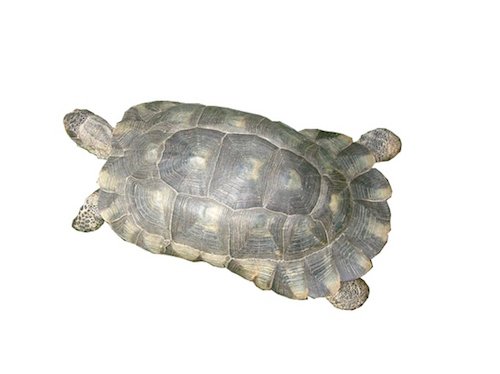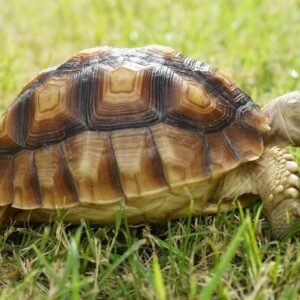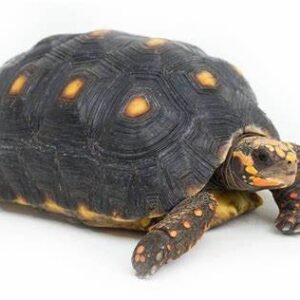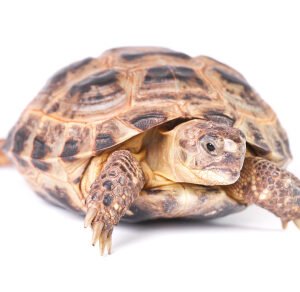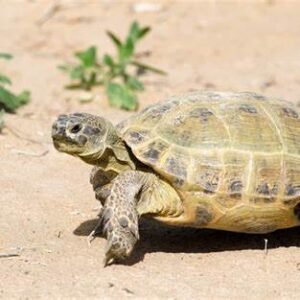Understanding the Marginated Tortoise
The marginated tortoise, scientifically known as Testudo marginata, is a fascinating species native to the Mediterranean region, particularly found in Greece and Italy. This tortoise is distinguishable by its robust shell, which has a unique raised, margined shape that offers excellent protection against predators. Typically, adult marginated tortoises can reach impressive sizes, measuring up to 12 inches in length. Their diet mainly comprises a variety of leafy greens, flowers, and some fruits, reflecting their natural herbivorous behavior.
In terms of behavior, the marginated tortoise exhibits both nocturnal and diurnal habits. While they are primarily diurnal, actively foraging and basking during the day, they will seek shelter and rest during the hotter parts of the afternoon. Understanding these behavioral patterns is crucial, especially for owners looking to create an environment that mimics their natural habitat. In captivity, it is vital to provide an appropriate temperature gradient, along with areas for both basking and hiding, to ensure optimal health and well-being.
Moreover, marginated tortoises are social creatures and exhibit distinct behaviors when interacting with others of their kind. In the wild, they tend to establish territories and socialize during the breeding season. It is essential for pet owners to simulate these social conditions carefully, providing enough space and opportunities for exercise and interaction. Captive marginated tortoises should be kept in spacious enclosures that allow for adequate movement and environmental enrichment.
The distinction between captive and wild marginated tortoises is significant. The captive environment must meet their specific needs, including proper humidity levels, temperature ranges, and access to UVB lighting, to replicate sunlight exposure, which is critical for their metabolism and overall health. When these elements are well-managed, marginated tortoises can thrive as delightful and engaging pets, contributing to their appeal among reptile enthusiasts.
Essential Care Tips for Marginated Tortoises
Caring for a marginated tortoise demands a comprehensive understanding of their specific needs to ensure their well-being. A proper habitat setup is fundamental in maintaining the health and happiness of these pets. Enclosure size is crucial; a larger space allows for adequate exercise and exploration, mirroring their natural habitat. For adults, an outdoor enclosure is ideal, as it provides ample room and natural elements. However, if an indoor environment is necessary, aim for a minimum of 4 feet by 8 feet, ensuring it is well-ventilated and escape-proof.
The substrate used within the enclosure should closely replicate their native environment. Options such as cypress mulch, coconut coir, or a mix of sand and soil are suitable, promoting burrowing and humidity control. It is essential also to create both shaded and warm areas within the habitat to allow for thermoregulation, which is vital for their metabolic functions.
Dietary requirements merit significant attention. Marginated tortoises thrive on a varied diet primarily consisting of leafy greens such as dandelion greens, kale, and collard greens, supplemented by certain vegetables and occasional fruits. These tortoises are herbivorous and require a high-fiber diet to maintain proper digestive health. Incorporating calcium and vitamin D3 supplements can enhance their nutrition, particularly if they do not receive extensive outdoor exposure to sunlight.
Regular health checks play a critical role in early disease detection. Observing your tortoise for any signs of illness, such as lethargy, refusal to eat, or respiratory issues, is essential. If any concerning symptoms arise, seeking veterinary care promptly can lead to successful interventions. Additionally, socializing and handling the tortoise require a gentle approach to familiarization, ensuring comfort and minimal stress. Creating an engaging, secure environment fosters a bond between the owner and the tortoise while enhancing its overall quality of life.

